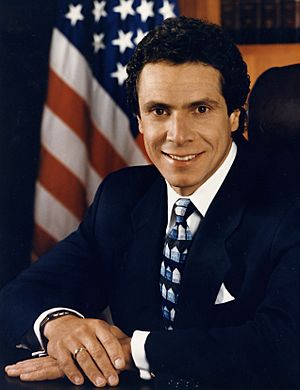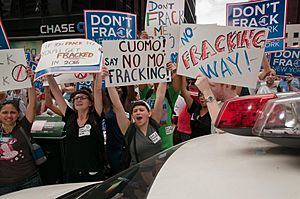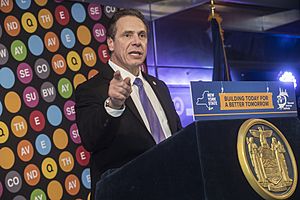Andrew Cuomo facts for kids
Quick facts for kids
Andrew Cuomo
|
|
|---|---|
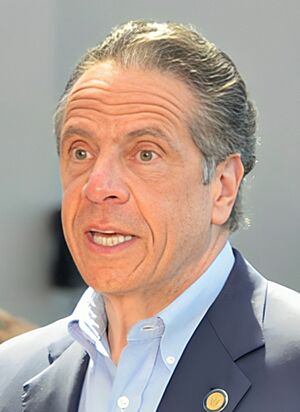
Cuomo in 2021
|
|
| 56th Governor of New York | |
| In office January 1, 2011 – August 23, 2021 |
|
| Lieutenant |
|
| Preceded by | David Paterson |
| Succeeded by | Kathy Hochul |
| Chair of the National Governors Association | |
| In office August 5, 2020 – July 8, 2021 |
|
| Vice Chair | Asa Hutchinson |
| Preceded by | Larry Hogan |
| Succeeded by | Asa Hutchinson |
| Vice Chair of the National Governors Association | |
| In office July 26, 2019 – August 5, 2020 |
|
| Chair | Larry Hogan |
| Preceded by | Larry Hogan |
| Succeeded by | Asa Hutchinson |
| 64th Attorney General of New York | |
| In office January 1, 2007 – December 31, 2010 |
|
| Governor | Eliot Spitzer David Paterson |
| Preceded by | Eliot Spitzer |
| Succeeded by | Eric Schneiderman |
| 11th United States Secretary of Housing and Urban Development | |
| In office January 29, 1997 – January 20, 2001 |
|
| President | Bill Clinton |
| Deputy | Saul N. Ramirez Jr. |
| Preceded by | Henry Cisneros |
| Succeeded by | Mel Martínez |
| Assistant Secretary of Housing and Urban Development for Community Planning and Development | |
| In office May 28, 1993 – January 29, 1997 |
|
| President | Bill Clinton |
| Preceded by | Skirma Kondratas |
| Succeeded by | Saul N. Ramirez Jr. |
| Personal details | |
| Born |
Andrew Mark Cuomo
December 6, 1957 New York City, New York, U.S. |
| Political party | Democratic |
| Spouse | |
| Domestic partner | Sandra Lee (2005–2019) |
| Children | 3 |
| Parents | Mario Cuomo Matilda Raffa |
| Relatives | Cuomo family |
| Education |
|
| Signature |  |
Andrew Mark Cuomo (born December 6, 1957) is an American lawyer and politician from New York. He is a member of the Democratic Party. His father, Mario Cuomo, was also a governor. Andrew Cuomo served as the 56th governor of New York from 2011 until he resigned in 2021.
Cuomo was born in Queens, New York City. He studied at Fordham University and Albany Law School. He started his career working for his father's election campaign in 1982. Later, he worked as a lawyer and led the New York City Homeless Commission. From 1993 to 2001, Cuomo worked in the United States Department of Housing and Urban Development (HUD) under President Bill Clinton. He was first an assistant secretary and then the secretary. In 2006, Cuomo was elected New York attorney general. He had tried to become governor in 2002 but did not win the primary election.
Cuomo won the Democratic primary for governor in 2010 and then the general election. He was re-elected in 2014 and 2018. As governor, he legalised same-sex marriage. His government also oversaw big construction projects like the Second Avenue Subway and the rebuilding of the Tappan Zee Bridge. He also signed a strict gun control law called the NY SAFE Act in 2013. Other changes included expanding Medicaid, raising taxes for the wealthy, and increasing the state's minimum wage.
Cuomo gained national attention for how he handled the COVID-19 pandemic in New York. He was first praised for his actions. However, he later faced criticism regarding his decisions about nursing homes during the pandemic. A report from the state attorney general in January 2021 found that the number of COVID-19 deaths in nursing homes was higher than first reported.
In August 2021, a report from independent investigators found that Cuomo had acted inappropriately towards several women. Following this report, many people, including President Joe Biden, called for him to resign. On August 23, 2021, Cuomo resigned from his position as governor. His lieutenant governor, Kathy Hochul, took over.
In March 2025, Cuomo announced he would run for mayor of New York City in the 2025 election. He lost the Democratic primary to Zohran Mamdani but decided to run as an independent candidate in July 2025.
Contents
- Early Life and Education
- Early Career in Public Service
- Leading the Housing Department
- Time in the Private Sector
- Running for Governor in 2002
- New York Attorney General
- Consideration for U.S. Senate
- Gubernatorial Elections
- Governor of New York (2011–2021)
- Post-Gubernatorial Career
- 2025 New York City Mayoral Campaign
- Personal Life
- See also
Early Life and Education
Andrew Mark Cuomo was born on December 6, 1957, in Queens, New York City. His parents were Mario Cuomo, a lawyer who later became governor, and Matilda Raffa.
Cuomo's family has Italian roots. His grandparents came from Southern Italy. He has four siblings. His younger brother, Chris Cuomo, is a journalist. His elder sister, Margaret Cuomo, is a radiologist.
Cuomo went to Archbishop Molloy High School, a private Catholic school, and graduated in 1975. He earned a Bachelor of Arts degree from Fordham University in 1979. He then received a law degree from Albany Law School in 1982.
Early Career in Public Service
After law school, Cuomo worked as the campaign manager for his father's successful run for governor in 1982. He then joined his father's staff as a policy advisor.
From 1984 to 1985, Cuomo worked as an assistant district attorney in Manhattan. He also worked at a law firm. In 1986, he started an organization called Housing Enterprise for the Less Privileged (HELP). He worked full-time for HELP starting in 1988. From 1990 to 1993, he led the New York City Homeless Commission under Mayor David Dinkins. This commission worked on ways to help people without homes and create more housing options.
Leading the Housing Department
In 1993, President Bill Clinton appointed Cuomo as Assistant Secretary for Community Planning and Development in the United States Department of Housing and Urban Development (HUD). After the previous Secretary left, Cuomo was chosen to take his place. The United States Senate approved him, and he served as Secretary from January 1997 to January 2001.
During his time as HUD Secretary, Cuomo worked to make housing more affordable and help more people own homes. He also tried to stop housing discrimination. He expanded programs to help people without homes find housing and jobs.
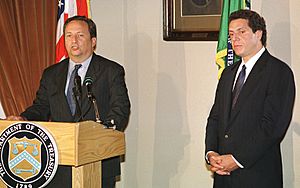
Cuomo encouraged more home ownership. He also pushed government lenders to give more loans to people with lower incomes. Some people believe this contributed to the 2007–2010 subprime mortgage crisis, but others disagree.
Before Cuomo's time, HUD was often listed as a government program with poor management. During his term, two of HUD's main departments were removed from this list. The department also reduced its staff by 15% to make operations more efficient.
Time in the Private Sector
From 2001 to 2006, Cuomo worked outside of government. He worked at the Fried Frank law firm from 2001 to 2004. Later, he worked for the Island Capital real estate company.
Running for Governor in 2002
Cuomo first ran for the Democratic nomination for New York governor in 2002. He was initially a strong candidate. However, his campaign faced difficulties after a comment he made about the September 11 attacks. He later withdrew from the race before the state convention.
New York Attorney General
Election to Attorney General
In 2006, Cuomo announced he would run for New York state attorney general. He won the Democratic Party's support. He then won the primary election with a majority of the votes. This was seen as a strong comeback for him. In the general election on November 7, 2006, he defeated the Republican candidate, Jeanine Pirro, winning 58% of the vote.
Key Actions as Attorney General
Police Surveillance Inquiry, 2007
In 2007, Cuomo's office criticized the administration of Governor Eliot Spitzer. This was because Spitzer's team had ordered the New York State Police to track the movements of then-Senate majority leader Joseph Bruno. Spitzer later apologized for this action.
Student Loan Investigation, 2007
In 2007, Cuomo led an important investigation into student loan practices. He looked into how some universities directed students to specific lenders, which sometimes led to higher interest rates for students. This investigation led to changes in lending policies at many universities. Many schools also returned millions of dollars in fees to students.
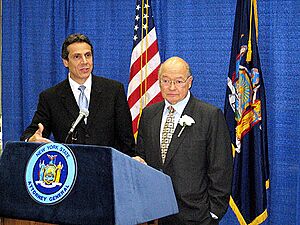
Corruption Investigations, 2009
Cuomo investigated a corruption scandal involving kickbacks. This investigation included New York investigators and other state attorneys general.
Consideration for U.S. Senate
After Hillary Clinton was chosen to be U.S. secretary of state in December 2008, then-New York governor David Paterson needed to appoint someone to fill her Senate seat temporarily. Cuomo was considered a top candidate for this position. However, on January 23, 2009, Governor Paterson announced he would appoint Kirsten Gillibrand to the U.S. Senate.
Gubernatorial Elections
2010 Election
On May 22, 2010, Cuomo announced his campaign for governor. He chose Robert Duffy, the Mayor of Rochester, as his running mate for lieutenant governor.
In the general election on November 2, 2010, Cuomo ran against Republican Carl Paladino. Cuomo won the election by a large margin, getting 62.6% of the votes.
2014 Election
Cuomo ran for re-election in 2014. His new running mate was Kathy Hochul. On November 4, 2014, Cuomo was re-elected for his second term with 54% of the vote. His margin of victory was smaller than in 2010.
2018 Election
Cuomo faced a challenge in the Democratic primary from actress and activist Cynthia Nixon. She criticized him on issues like the New York City Subway system. Cuomo won the primary election.
On November 6, 2018, the Cuomo-Hochul team won the general election.
2022 Election
In May 2019, Governor Cuomo announced he would run for a fourth term. However, in August 2021, after a report was released by the attorney general of New York, Letitia James, Cuomo resigned as Governor. He stated he was innocent but resigned to avoid a difficult process. He did not seek his party's nomination after his resignation.
Governor of New York (2011–2021)
Cuomo became governor on January 1, 2011. In his first year, he worked to pass a state budget without raising taxes. He also signed laws for ethics reform and a property tax cap. He helped pass a bill to allow same-sex marriage.
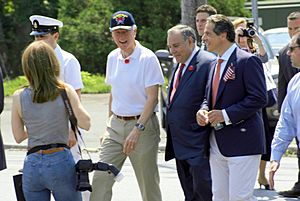
There was talk in the media about Cuomo possibly running for president in 2016 or 2020. He denied these rumors.
In February 2019, Cuomo's approval rating dropped to 43%. This was the lowest during his time as governor. However, by early 2020, his approval rating went up to 77%, which was a record high.
Corporate Incentives
Cuomo supported giving tax breaks and other benefits to attract businesses to New York State. He even joked in 2018 that he would change his name to "Amazon Cuomo" if Amazon chose New York for its second headquarters. Amazon eventually chose two locations, including New York City, but later withdrew from the New York plan due to local opposition.
COVID-19 Pandemic Response
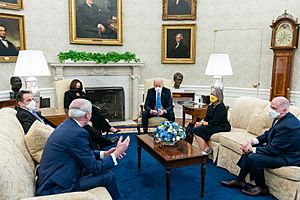
On March 1, 2020, Cuomo announced the first positive case of the new coronavirus in New York State. He said that the spread of the virus was "inevitable." He also announced plans to increase testing for the virus.
Early in the pandemic, Cuomo received praise for his actions, including a statewide lockdown and closing nonessential businesses. However, he also faced criticism for not fully understanding the seriousness of the pandemic at first.
In the spring of 2020, some people on social media and TV called him "Cuomosexuals" to show their admiration for him and his brother, Chris Cuomo, during the pandemic.
In June 2021, Cuomo lifted COVID-19 restrictions after 70% of adults in New York had received at least one dose of the vaccine.
In October 2020, Cuomo published a book called American Crisis. He wrote that New York had "confronted and defeated" the virus. He was paid more than $5 million for the book. In November 2020, he received an award for his coronavirus briefings. However, this award was later taken back in August 2021 after a report about his conduct.
In December 2021, Cuomo was ordered to return $5.1 million in book profits to New York state. This was because he was accused of using state resources and staff to write the book. Cuomo denied these claims and sued the ethics commission. In August 2022, he won the lawsuit and was allowed to keep the money.
During the pandemic, nine state health officials resigned. In January 2021, Cuomo stated that he did not trust the advice of health officials.
Criminal Justice
In August 2017, Cuomo's administration gave over $7 million to New York colleges to offer courses to prisoners. In January 2018, he suggested changes to reduce trial delays and make it easier for former convicts to find jobs. He also called for an end to cash bail for minor crimes.
Cuomo pardoned 140 adults who had been convicted of nonviolent crimes as teenagers and had already served their sentences. He also pardoned 18 others who had served their sentences for nonviolent crimes but faced deportation.
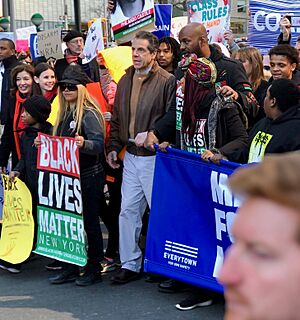
Energy and Environment
In 2017, Cuomo announced that the Indian Point nuclear plant would close. This plant produced a quarter of New York City's power. Its closure meant that power from fossil fuels replaced the clean energy it provided.
In June 2012, Cuomo's administration considered allowing hydraulic fracturing (fracking) to boost the economy in upstate New York. However, critics worried it could pollute the water supply. After a study showed "significant public health risks," Cuomo's administration announced a ban on fracking in New York State on December 17, 2014.
Gun Control Laws
On January 15, 2013, Cuomo signed the NY SAFE Act into law. This was the first state gun control bill passed after the Sandy Hook Elementary School shooting in Connecticut. It was described as the toughest gun control law in the United States.
On April 2, 2018, Cuomo announced a new law that prevents people convicted of domestic violence from owning firearms. On February 25, 2019, he signed the "red flag" gun protection law. This law allows a court to temporarily stop someone from buying or owning a gun if they are seen as a threat.
On July 30, 2019, Cuomo signed two laws. One banned the making and selling of 3D printed guns. The other required safe storage of firearms in homes with children younger than 16.
On July 7, 2021, Cuomo declared the first 'disaster emergency' in the United States on gun crime for New York.
Hurricane Sandy Response

After Hurricane Sandy in October 2012, Cuomo allowed New York voters who were displaced to cast special ballots anywhere in the state. He also created a commission to review how New York utility companies responded to the storm's damage.
There was some debate when Cuomo's administration used $140 million, including federal disaster funds, to pay for national TV ads. These ads promoted "New New York" slogans to attract businesses. Critics called these ads "a waste of taxpayer money."
New York City Subway
In June 2017, after several subway problems, Cuomo declared a "state of emergency" for the New York City Subway system. According to The New York Times, both New York City mayors and governors, including Cuomo, were partly responsible for the subway system's declining quality and high construction costs.
Public College Tuition
On April 18, 2017, Cuomo signed the New York State 2018 budget. It included the Excelsior Scholarship. This program allows families earning less than $125,000 to have free tuition at all SUNY and CUNY universities.
Public Employees
On July 16, 2011, Cuomo reached a deal with the Public Employees Federation. This deal ended pay raises, included furlough days, and required more contributions to health insurance.
Public Housing
In early 2018, Cuomo responded to a lawsuit against the New York City Housing Authority (NYCHA). The lawsuit was brought by public housing tenants about poor living conditions. By April, Cuomo appointed an independent monitor to oversee NYCHA.
Same-Sex Marriage
Cuomo signed the Marriage Equality Act, which allowed same-sex marriage, on June 24, 2011. He had promised to do this during his campaign. He later called for all states to allow same-sex marriage. Cuomo was praised for his efforts to pass this law.
Cuomo also ordered a boycott of Indiana and North Carolina to protest their laws on LGBT issues.
Start-Up NY Program
In July 2016, a state agency reported that the Start-Up NY program had created 408 jobs since 2014. This program offered tax incentives to businesses. Ads promoting the program had cost at least $53 million.
Taxes
Cuomo was recognized for his 2011 changes to the New York State tax code. In 2021, he signed a tax increase for high-income workers, corporations, and wealthy individuals. This increase is set to last until 2027.
Voting Rights
In April 2018, Cuomo announced that he would restore the voting rights of people on parolees through an executive order. He said he would consider restoring the rights of over 35,000 parolees.
Post-Gubernatorial Career
Cuomo began receiving a state retirement pension on September 1, 2021, based on his years of service as attorney general and governor. After resigning, he worked as an advisor for a Seychelles-based cryptocurrency exchange.
On March 3, 2022, in his first public appearance since resigning, Cuomo gave a speech in Brooklyn. He spoke against "cancel culture" and hinted at a return to politics. He said, "Contrary to what my political opponents would have you believe, nothing I did violated the law or the regulation."
In March 2022, Cuomo announced plans to create an organization called "Progressives for Israel."
In February 2023, Andrew Cuomo criticized President Biden regarding issues at the Mexican border and the displacement of migrants within the United States.
2025 New York City Mayoral Campaign
On March 1, 2025, Cuomo announced he was running for mayor in the 2025 New York City mayoral election. He focused his campaign on public safety and affordable housing. He presented himself as a progressive because of the liberal policies he passed as governor. However, he is also known as a moderate.
On May 7, 2025, Cuomo also filed to run as an independent candidate under the "Fight and Deliver Party" ticket. This allowed him to stay on the general election ballot even if he lost the Democratic primary. He emphasized his experience as governor and his opposition to antisemitism. He supported increasing the size of the police, a $20 minimum wage, building 500,000 new homes, and tax relief.
On June 24, 2025, Cuomo accepted that he had lost the Democratic primary nomination to Zohran Mamdani. However, he confirmed on July 14, 2025, that he would continue to campaign as an independent candidate for the general election.
Personal Life
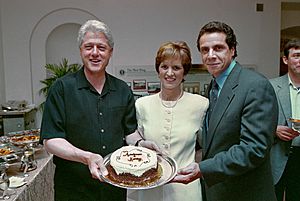
Cuomo married Kerry Kennedy, the daughter of Robert F. Kennedy, on June 9, 1990. They have three daughters: twins Cara and Mariah (born 1995), and Michaela (born 1997). They separated in 2003 and divorced in 2005.
Cuomo started dating Food Network host Sandra Lee in 2005. They lived together in Westchester County, New York. On September 25, 2019, they announced they had ended their relationship.
On July 4, 2015, Cuomo led the wedding ceremony for his friend, musician Billy Joel.
Cuomo is Catholic. During the COVID-19 pandemic, Cuomo was sometimes called the "Love Gov." This nickname came from a playful exchange with his brother, Chris Cuomo, about showing a softer side while leading the state's pandemic response.
Cuomo drives a 1968 Pontiac GTO and a Dodge Charger.
See also
 In Spanish: Andrew Cuomo para niños
In Spanish: Andrew Cuomo para niños


